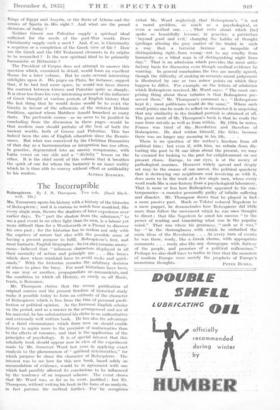The Incorruptible
Mit, THOMPSON opens his history with history of the histories of Robespierre ; and it is curious to watch how mankind, like every single man, throws the shadows of later experience over earlier days. To " part the shadow from the substance," to see,a past event, in no other light than its own, is a labour yet more difficult, than for a, Wordsworth or a..Proust to discover his own past ; for the historian has to reckon. not only with the caprices of nature..but also.. with- the possible sense of •
• having a present purpose to fulfil. Robespierre's first, and most fantastic, English biographer—laa4orshe) remains anony- • characters, displayed in all
inous7-believed t 7' infamous their enormity of action. and principle are like buoys which show. where mankind have to avoid rocks and quick- sands." With the historian .remains• the arbitrary decision of where to, place the buoy.. For most historians have been, in one way or another, propagandists or wromanticists, and • the condition to which. all History, as surely us •all Music, tends, is Romance.
Mr. Thompson , claims, that the recent publication of original sources and the present freedom of historical study make it possible today to form an estimate of the character of Robespierre which. is free from the bias, of personal predi- lection or .political opinion. • As the foremost English scholar on the period; and as a.master in the arrangement and use of his material; he has substantiated his claim in an authoritative and extremely well written book. , He has also the advantage of a third circumstance which from now On should enable precision of mathematics than history to aspire more to the
to•the effects of romance, and that is the application of the principles of psychology. It is ..of special interest that this scholarly book should appear now in view of the experiment made. by Mr. Somerset. Ward last .year. in applying exact analysis to the phenomenon of ".spiritual deterioratioa," for which purpose he chose the character of Robespierre. The interest was to see how far this new book, based solely on accumulation of evidence, would be in agreement • with one which had possibly allowed. its. conclusions to be influenced by the tendency. of an imposed scheme.. The event shows that Mr:- Ward was, so far as lie went, justified ; but Mr. Thompson, without writing his book in the form of un analysis, in fact .pursues the method further, .Tor ' recognises
(what Mr. Ward neglected) -that Robespierre's " is not a moral problem,' fib much as as psychological, or even a • medical one. . „ That vertu about which [he] spoke so beautifully became; in practice, a patriotism beyond good and evil,' changing the habits of thought ' (perhaps altering the grey matter. of the brain) in such a.. way that a . terrorist • became as incapable of distinguishing right, from wrong—not. to say cruelty from • humanity—as a blind man is of distinguishing night from . day." That is an admission which. provides the most satis- factory basis for discussion even though medical .evidence be wanting.. In general conclusions the two are mostly agreed, though the difficulty of .making an accurate moral judgement is illustrated by one or two .minor points on which they happen to differ. For example, on the letters of adulation which Robespierre received, Mr. Ward says : " The most sure prising . thing about these tributes is that Robespierre pre- served them." Mr. Thompson's comment is : ".Robespierre kept it ; most politicians would•do the same." . Where such small points can be made to reflect on character it is surprising that any similarity in the .finished portrait • is obtained at all.
The great merit of Mr. Thompson's book is that he reads the : man from outside as well as &pm within. By 1794-, he notes,
France was tired • of the __Revolution and therefore of . Robespierre. lie died within himself, Ake Glitz, because • there was no longer any meaning in. his life.. .
There is no question of the author's freedom from all political bias ; but even if, with.him, we refrain from dis- torting. the .past to fit our ideas about the present,. we may be excused -for looking to the past• for enlightenment on our . present chaos. • Europe, to our eyes, is at the mercy of pathological.. maniacs. However widely spread and deeply , set maybe the causes of our.. unrest, the political quackery that is destroying our neighbours• and involving us with it, does seem to. be the: work of a. few single men, whose every . word reads like a case-history.from a psychological laboratory. • That is more or less how Robespierre appeared to his Comm.• temporaries—a monster personally guilty of infinite suffering and disaster. Mr. Thompson shows that he: played in fact a more passive part. Much as Tolstoi reduced Napoleon to a mere puppet, he demonstrates how Robespierre did little more than follow the movement which he was once thought to direct ; that like Napoleon he owed his success " to the power of reading and translating what. was in the popular Mind." That was where his greatness„" such as it was," lay—" in the thoroughness-with which he embodied the main ideas of the Revolution . „ . At. every, turn, of events he was there, ready, - like a -,Greek, chorus, with appropriate comments . . . ready also like any demagogue with flattery of the people, . and promises . of a political millennium." Perhaps we also shall have.to realise in time that the monsters of modern Europe were. merely the prophets of Europe's












































 Previous page
Previous page